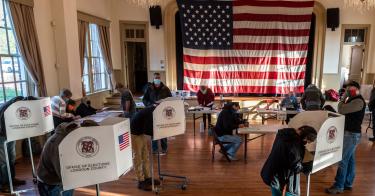It wasn’t clear by Wednesday afternoon who had won the White House, but one bad idea was soundly defeated on Tuesday: identity politics. The concept that the country should be divided into aggrieved categories based on race, national origin or sex—now a core tenet of the Democratic Party—lost from coast to coast.
It lost in Miami-Dade County, Fla., where Cuban-Americans delivered votes for President Trump. We don’t know the final margin, but some polls going into the election had the president leading among Cuban-American voters by a margin as wide as 38 points. Identity politics also lost in Osceola County, near Orlando, where Mr. Trump appears to have done better than expected among Puerto Rican voters.
Identity politics lost in South Texas: Zapata County, 95% Mexican-American, went for Hillary Clinton by 33 points in 2016—but Mr. Trump won with 52.5% this time. Throughout the Rio Grande Valley, President Trump did better in 2020 than in 2016: In Starr County he lost by only five points (47% to Mr. Biden’s 52%), compared with a 60-point spread in Mrs. Clinton’s favor four years ago. In Jim Hogg County Mr. Trump lost by 18 points, down from more than 50 in 2016. In Webb County Mr. Trump won 36.6% of the vote, up from 22.8% in 2016.
Identity politics even took it on the chin in California, where voters defeated an attempt to revoke Proposition 209, the 1996 ballot measure that bans the use of race, national origin or sex by state universities and other agencies. The left has spent almost a quarter-century trying to reverse that decision, but its latest attempt lost handily.
Chinese-American parents in the Golden State led the opposition to this attempt to reintroduce racial preferences, sometimes fighting Asian-American affinity organizations such as Chinese for Affirmative Action and Asian Americans Advancing Justice, which seem to put the interests of leftist white donors ahead of those of immigrant parents.
In other words, the progressive cobbling of pan-ethnicities that dates to the 1970s—a way to instill members of minority groups with grievances and push them to overthrow the American constitutional system—took a hit this Election Day.
Nikole Hannah-Jones, the pugnacious creator of the New York Times’s “1619 Project,” tweeted on Tuesday: “One day after this election is over I am going to write a piece about how Latino is a contrived ethnic category that artificially lumps white Cubans with Black Puerto Ricans and indigenous Guatemalans and helps explains [sic] why Latinos support Trump at the second highest rate.”
Not every day do I agree with Ms. Hannah-Jones. But I’ve written two books, multiple research papers, essays and op-eds on this matter, and she is correct: These are contrived categories, fabricated terms “with no basis in ethnicity, culture, or race,” as I put it in a 2019 essay.
Ms. Hannah-Jones subsequently tweeted that the Latino category and others were “created by white people.” They were, though not the way she imagines. These categories were the brainchild of leftist activists—in the “Hispanic” case, Chicano movement activists—who were often richly funded by the likes of the Ford Foundation and other backers, and who then put incredible pressure on reluctant bureaucrats to make these groups official in the census and all other government surveys.
The activists weren’t after accurate counts, then or now, no matter what they say. They wanted to create minorities. As the Berkeley professor Cristina Mora aptly puts in her 2014 book, “Making Hispanics”: “It is one thing to classify a population and another to count it. For Mexican American and Puerto Rican activists in the late 1960s, these issues were inherently related.”
This is why La Raza executive director Raul Yzaguirre urged the Census Bureau in 1974 to drop the national-origin questions it had been asking for more than a century and instead create groups. “There is a difference between a minority group and a national origin group—a difference recognized in terms of national economic and social policies,” he wrote.
The instilling of grievances into the members of the minority groups is carried out by organizations like Asian Americans Advancing Justice, for “Asian-Americans,” or by groups like Voto Latino, for “Hispanics.” Listen to what Voto Latino María Teresa Kumar said during an August Zoom call that also included Ms. Hannah-Jones and Black Lives Matter founder Alicia Garza:
“The challenge with the work that I do at Voto Latino is that I can’t get people agitated because often times they don’t know the great harm that has happened under the structures that we have been raised by,” she said. “But once they start understanding it and recognizing it, they act and react, and fight and run for office.”
In other words, Ms. Kumar sees her job as indoctrination, telling immigrants and their children that the country they have come to is an awful place, which owes them compensatory justice. That such absurd propositions were defeated throughout the country by voters who saw themselves as Americans, not victims, is something to be celebrated, no matter who wins the White House.
This piece originally appeared in the Wall Street Journal on 11/4/20




